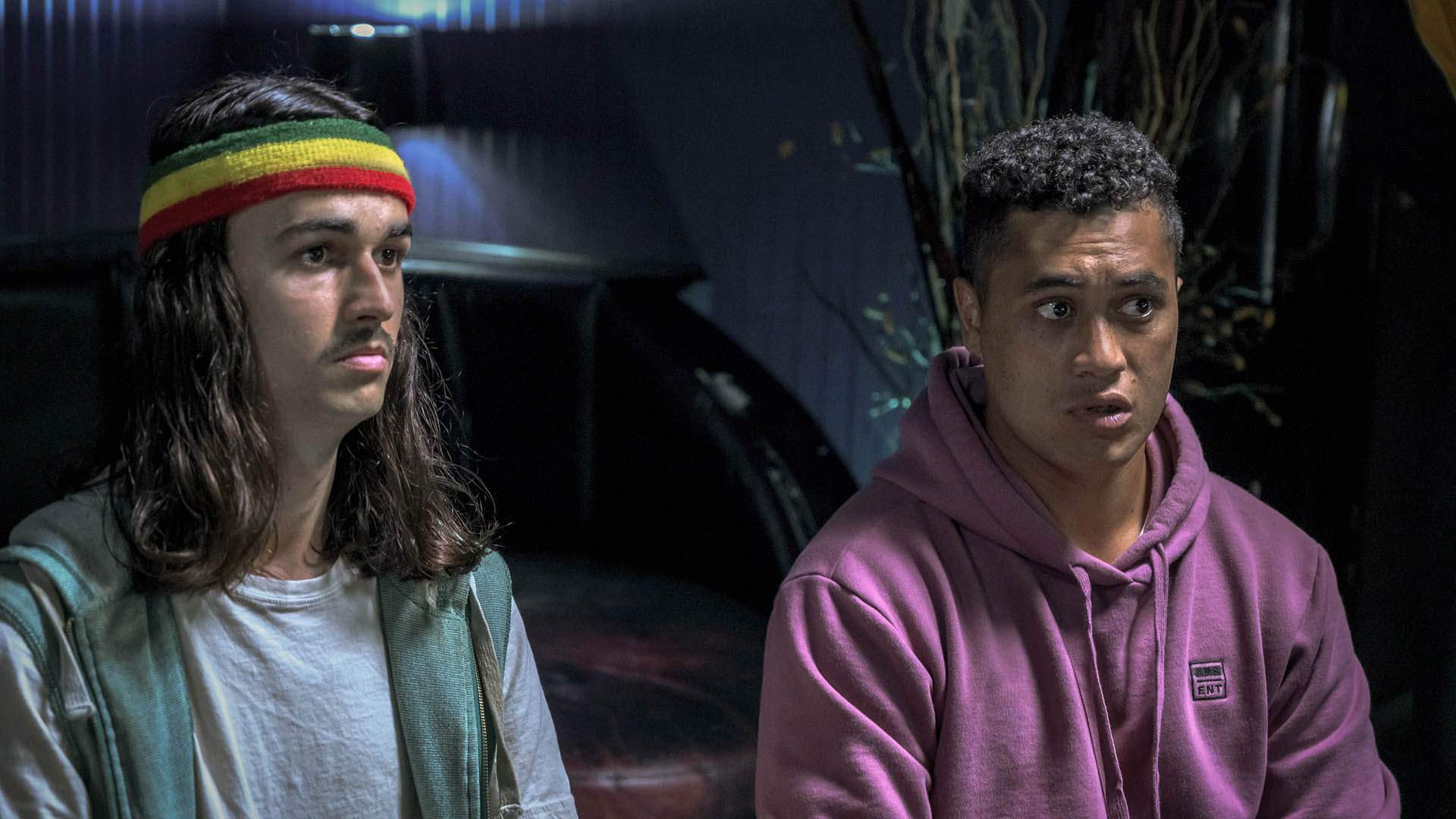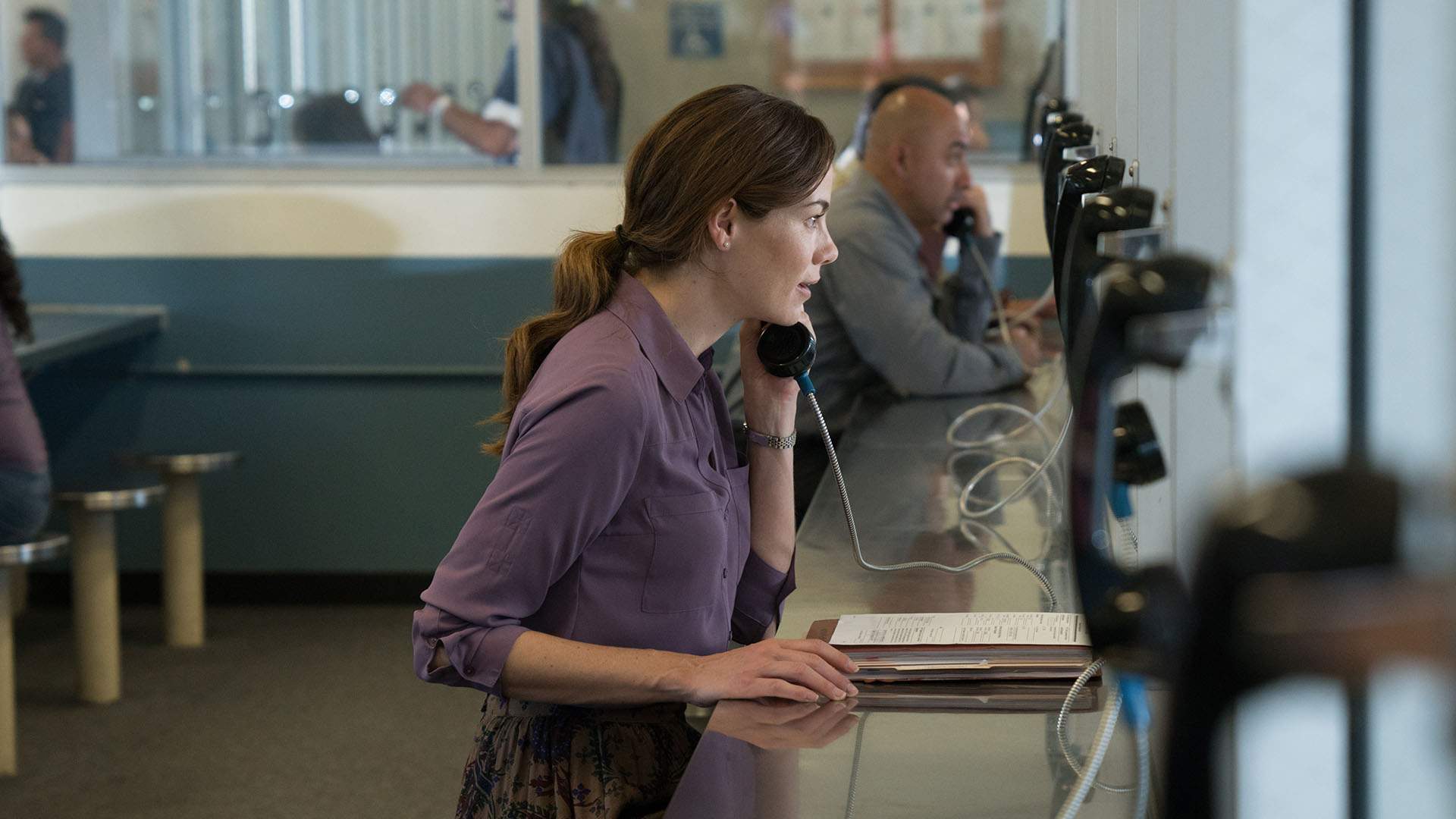The New Movies You Can Watch at New Zealand Cinemas This Week
Head to the flicks to see Christopher Nolan's latest action-packed spectacle, a local crime comedy or a big-budget Chinese war movie.
Something delightful is happening in cinemas across the country. After months spent empty, with projectors silent, theatres bare and the smell of popcorn fading, New Zealand picture palaces are finally open — spanning both big chains and smaller independent sites in Auckland and Wellington.
During COVID-19 lockdowns, no one was short on things to watch, of course. In fact, you probably feel like you've streamed every movie ever made over the past three months, including comedies, music documentaries, Studio Ghibli's animated fare and Nicolas Cage-starring flicks. But, even if you've spent all your time of late glued to your small screen, we're betting you just can't wait to sit in a darkened room and soak up the splendour of the bigger version. Thankfully, plenty of new films are hitting cinemas so that you can do just that — and we've rounded up, watched and reviewed some of the new releases on offer this week.

TENET
Christopher Nolan has never made a Bond film. He certainly didn't helm The Matrix franchise, either. But pick and twist aspects of each, including narrative tropes, sci-fi trickery and special effects wizardry, and the writer/director's latest slick, bold, mind-bending action-thriller Tenet is the end product. Spy flick elements are evident from the outset, thanks to a tense, taut, supremely well-executed opening attack on the jam-packed Kiev Opera House. When a gun fires during the chaos, but the bullet returns to the weapon rather than shooting out from it, Tenet's nods to late 90s and early 00s sci-fi are apparent, too. Soon afterwards, a scientist (Clémence Poésy) talks the film's CIA operative protagonist (BlacKkKlansman's John David Washington) through some of the nuts and bolts of the shadowy situation he finds himself in, explaining that inverted objects being sent back through time from the future, that a war is coming, and detailing the reverse trajectory of the bullet — and the Protagonist, as he's literally called, exclaims a Keanu-esque "whoa!" that's particularly memorable.
Armed with the relevant background — tidbits the film wants viewers to pay close attention to as well — the Protagonist must hop around the world to stop life as everyone knows it from ending. He has suave handler Neil (Robert Pattinson) for company, but if Tenet's premise sounds a tad vague and convoluted, well, that's the movie's wavelength. As obsessed with time, space, existence and consciousness as much of Nolan's work, the cerebral feature doesn't get any less tangled or labyrinthine, or try to. It boasts the kind of plot that is actually quite straightforward, yet is told in an overly complicated fashion to keep viewers puzzling. Nolan likes messing with audiences' heads, so this shouldn't come as a surprise; however he jumps even beyond Inception's leaps, The Prestige's magic tricks and Interstellar's temporal dilations. As a result, as entertaining and downright spectacular as it is when it's at its action-packed best, there's also a sense that Tenet is bounding forward in some ways, while also needlessly looping back on itself in others. It's stirring, but also laborious. It's designed to overwhelm viewers in an inventive head trip, yet it makes the audience feel like they're working. It's intricate and exacting, and also messy and repetitive. It's a Nolan film through and through, in other words — usually to a mesmerising degree, but too indulgently as well.
Read our full review.

THE EIGHT HUNDRED
The first Chinese film shot entirely on IMAX cameras, The Eight Hundred delivers exactly what that status demands. That'd be an impressively staged and shot spectacle, and plenty of it. Indeed, this big-budget dramatisation of the October 1937 Sihang Warehouse standoff during the Second Sino-Japanese War (which also formed part of the Second World War) is filled with fights, frays, combat and bloody confrontations to an almost relentless extent. Of course, that's the war movie formula, with the genre routinely endeavouring to steep viewers so deeply in the minutiae of the action that they feel both the mass and the personal toll. In The Eight Hundred's case, that means spending the bulk of its lengthy 147-minute duration with the 400-plus soldiers from the 524th Regiment of the National Revolutionary Army's 88th Division, who hold their ground for four days as the Imperial Japanese Army closes in on and wages an assault on the building — with the latter already overpowering Chinese forces at large during the Battle of Shanghai, and the former now representing China's last stand in the city.
Complicating matters tactically, at least for the Japanese, is the warehouse's location. Adjacent to Suzhou Creek, and therefore across from Shanghai's International Settlement, the structure is in full view of the neutral zone. For writer/director Guan Hu (Mr Six), however, that gives the film an extra opportunity to dazzle visually. On one side of the waterway sits carnage; on the other, luxury, shining lights and streets filled with well-dressed onlookers all beckon. Yes, The Eight Hundred is that blunt. Yes, it takes every opportunity to be as blatant as possible on as many levels as possible, too. This is a feature that uses a white horse galloping through the mayhem as one of its overt metaphors, after all, and deploys 'Londonderry Air', aka 'Danny Boy', as its emotive song of choice. Also among its sizeable list of heavy-handed touches: repeatedly making the case for sacrifice and bloodshed in the name of China's glory and greater good, visibly adoring solider point-of-view shots, and offering little in the way of depth amongst its heaving roster of characters.

SAINT JUDY
Inspiring true tale, average movie: too often when it comes to recreating real-life stories about impressive folks, that proves the case. It certainly is with Saint Judy, which has a very worthy figure as its subject. A public defender turned crusader for detained immigrants fighting to stay in the US — and often desperate to avoid returning to their home countries where they face maltreatment and even death — Judy Wood is credited with bringing about a significant change to America's asylum laws. Before the case that the film focuses on, women who were oppressed and punished for fighting for the rights of their gender in nations that treat females poorly were not recognised as the victims of persecution by the US. Wood strove to ensure that the judicial system saw the error of that viewpoint, using the case of Afghani teacher Asefa Ashwari as her example, and obviously this movie wouldn't exist if she hadn't managed to have an impact. But Saint Judy remains content to relay her experiences in standard legal-drama fashion, and to come off as a lesser version of Erin Brockovich along the way.
As directed by Sean Hanish (Return to Zero) and scripted by debutant Dmitry Portnoy, this film cycles through all of the stock-standard plot points seen in many a movie in this genre. While the minutiae here is based on truth, the feature's approach (including its beige colour scheme) makes the details of Wood's life feel routine. She's a single mother who has moved to the other side of the country, starts working for a jaded boss (Alfred Molina), and immediately finds the system against her and her first client (Leem Lubany). Indeed, even if you've never heard of Wood or her achievements, you'll be able to predict every twist and turn that the feature serves up. It feels like a wasted opportunity as a result, with top-notch legal flicks able to both move and inform when they're done well — take this year's Just Mercy, for instance. Monaghan, who has been getting better roles on TV than in cinema of late (see: True Detective, The Path and Messiah) puts in a strong performance though, one that makes you wish the movie's script tried harder. Also potent in limited screen time is Common as a surprisingly empathetic lawyer on the other side.

LOWDOWN DIRTY CRIMINALS
A decade ago, New Zealand actor James Rolleston burst onto cinemas screens with a cheeky grin and an earnest and engaging presence, as seen in his starring role in Taika Waititi's Boy. And while he has only added a handful of roles to his resume since, he always demands attention — in drama The Dark Horse, in Māori action-adventure epic The Dead Lands, in the acting school-set The Rehearsal and in hilariously funny female-driven rom-com The Breaker Upperers, for example. You can add Lowdown Dirty Criminals to the list, too, albeit with a strong caveat. Playing a pizza delivery guy who dreams of a better life and, after his latest job gone wrong, willing to employ drastic means to improve his situation, Rolleston is the best thing about this crime comedy. His is an understated but always supremely watchable performance; however nothing about the purposefully scrappy but always struggling movie around him earns the same description.
Rolleston's Freddy and his dimwitted best mate Marvin (Samuel Austin) want to get 'high on the hog', as they repeat over and over, and they see local shady nightclub owner and crim Spiggs (Scott Willis) as their gateway to riches. Soon enough, they're trying to prove themselves to their new boss, including by agreeing to kill the man (Min Kim) sleeping with his wife (Fingal Pollock). Given that Lowdown Dirty Criminals starts with all the film's main players in a Quentin Tarantino or Guy Ritchie-style standoff, the fact that Freddy and Marvin's plan doesn't go smoothy never comes as a surprise — and, thanks to clunky dialogue and laboured scenarios, never plays as amusing either. Director Paul Murphy (Love Birds) and screenwriter David Brechin-Smith (TV's Doubt: The Scott Watson Case) may nod to their influences at every opportunity (hint: they really love 90s and 00s crime capers), but their feature suffers terribly from the comparison. Also missing the mark: the supporting cast, which includes Rebecca Gibney as a vicious heavy called The Upholsterer, and the use of a disjointed narrative structure to attempt to make a slim plot seem more complicated than it is.

PENINSULA
If, prior to 2016, you'd ever wondered what might happen should zombies overtake South Korea, Train to Busanand Seoul Station arrived to answer that question. The first was a live-action thriller that tasked a locomotive full of living, breathing humans with battling the shuffling undead in one of the genre's best and most action-packed outings, while the second served up an animated prequel that detailed the start of the epidemic in another city. Now lands Peninsula, in case if you've since spent the past four years pondering what could occur next. Once again directed by Yeon Sang-ho, as all films in the franchise have been, it leaps forward to the present day to explore the plight of the apocalypse's survivors — including those initially lucky enough to flee via boat to Hong Kong, such as army Captain Jung-seok (Gang Dong-won) and his brother-in-law Chul-min (Kim Do-yoon); and folks like mother Min-jung (Lee Jung-hyun) and her daughters Joon (Lee Re) and Yu-jin (Lee Ye-won), who weren't as fortunate.
All of the aforementioned characters cross paths when Jung-seok and Chul-min are recruited by Hong Kong heavies to head back to the abandoned and quarantined Incheon, where a truck filled with cash awaits. Zombies don't care about money, of course, so the city's valuables are there for he taking. But Incheon isn't completely empty, with Min-jung and her children spending years evading flesh-munchers and escaping a brutal rogue militia group that call themselves Unit 631. If Train to Busan took a Snakes on a Plane-esque idea, changed it to zombies on a train and made a top-notch movie in the process, Peninsula opts for decidedly dystopian Mad Max-meets-Fast and Furious-meets-World War Z heist flick setup — and, while it doesn't quiet reach its predecessor's heights or add anything new to the heaving undead genre, it is thoroughly entertaining. Cuts to an English-language talk show that explains what's going on are both needlessly exposition-heavy and cringe-inducing, but the film's grounded performances, ample array of fantastic setpieces and swift editing by Parasite Oscar-nominee Yang Jin-mo are always riveting.
Read our full review.

If you're wondering what else is currently screening in cinemas, check out our full reviews of The Personal History of David Copperfield, Waves and The King of Staten Island.








